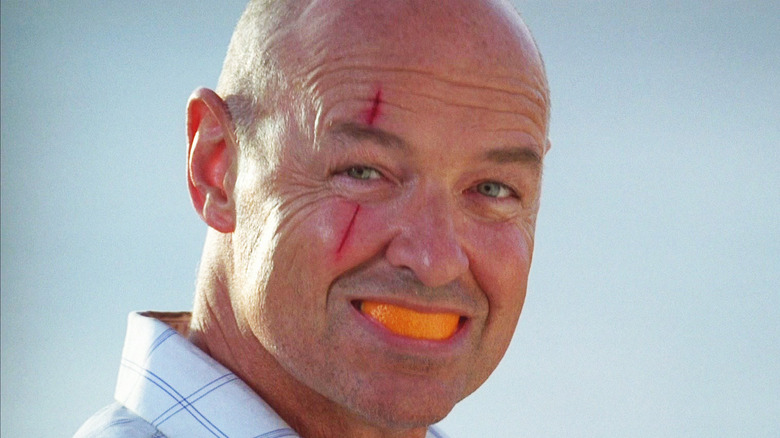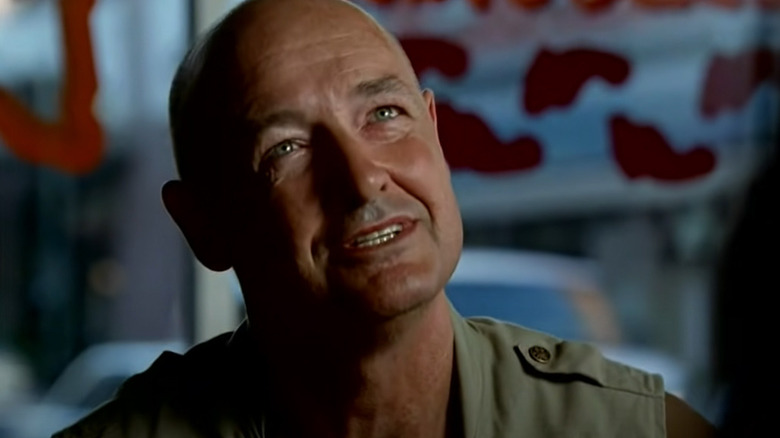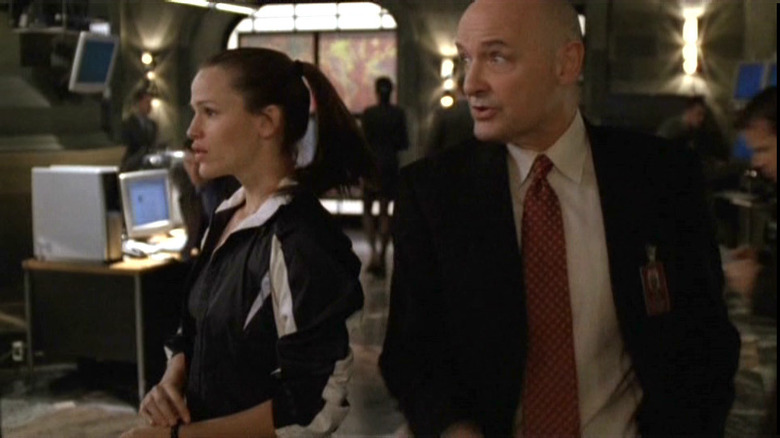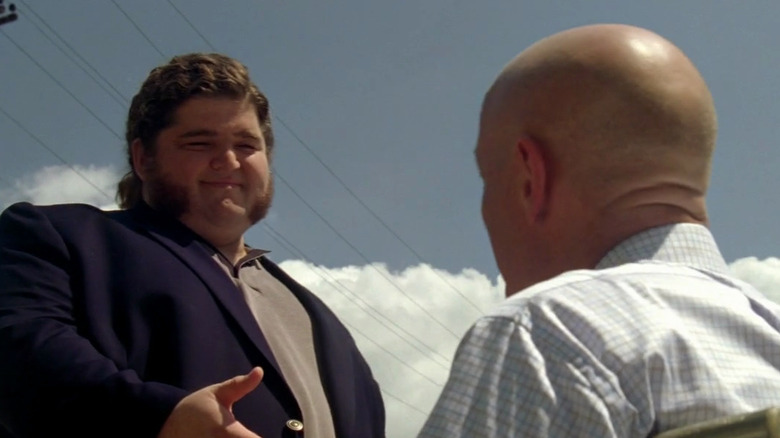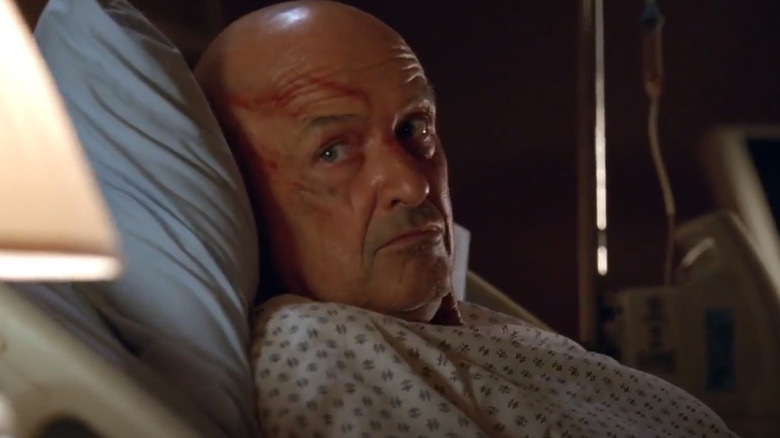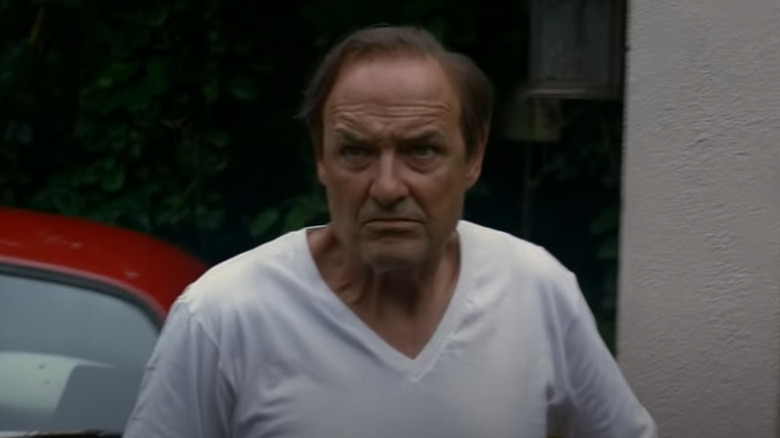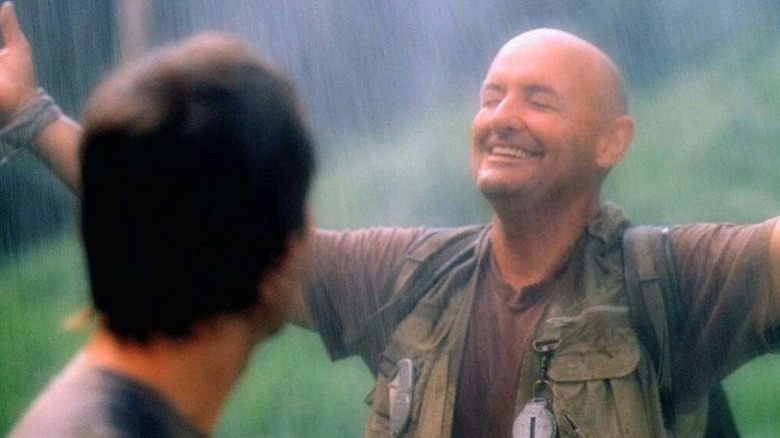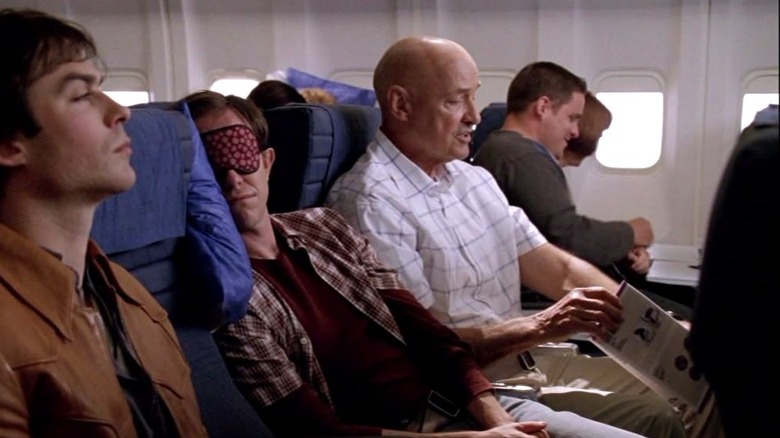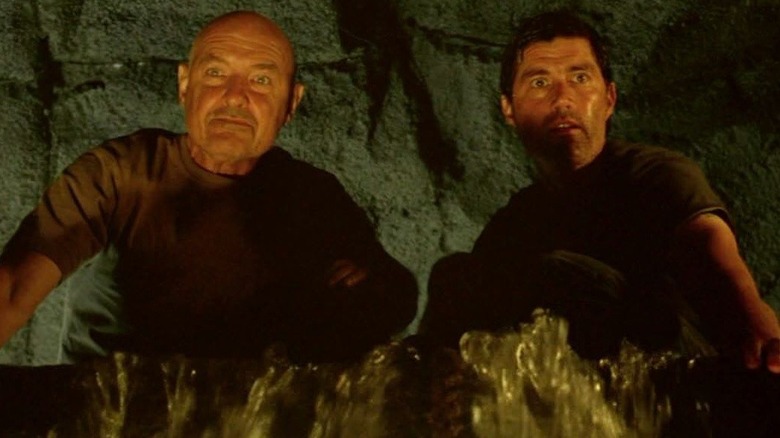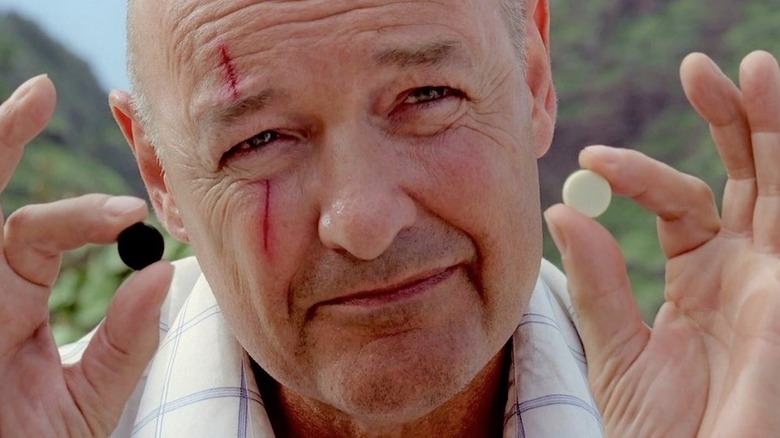The Untold Truth Of John Locke From Lost
Mind-bending castaway drama "Lost" captivates audiences through shocking plot twists, supernatural elements, and incredible characters. While the series is packed with intriguing figures, John Locke (Terry O'Quinn) stands out as one of the absolute best. A troubled man with a mysterious past, Locke is a man of faith — almost to the point of it being a fault. This often brings him into conflict with Jack Shephard (Matthew Fox), who is, in contrast, a man of science. Naturally, the series ends with an ultimate battle between the two.
Years after "Lost" aired its unforgettable ending, it remains a pop culture touchstone — as does John Locke. At his best, worst, and everywhere in between, he is a symbol of everything that makes "Lost" such a bizarre, exhilarating, and ultimately unforgettable tale. But even the most devoted "Lost" fans don't know everything about this enigmatic man. From the origins of his name to his relationship with the Man in Black, this is the untold truth of John Locke.
Locke's philosophical roots
"Lost" is an incredibly philosophical show. It brings up questions of good and evil, ponders religious dogma, and tackles the world-ending implications of its storylines. Certain episode titles make this philosophical streak overt — recall "The Greater Good" and "Tabula Rasa" — but even they aren't as obvious as Locke's name. It comes from the real John Locke, an English philosopher considered to be one of the most prominent figures of the Enlightenment, according to Encyclopedia Britannica. Locke had a particularly enormous influence on the founding of the United States, especially with regard to his theories of individual rights and the proper origins of authority.
These ideals drive the John Locke of "Lost," albeit somewhat abstractly. When Locke tells Shannon (Maggie Grace) that everyone on the island gets a new life, he's embracing the real Locke's concepts of individual freedoms. Locke also takes on the alias Jeremy Bentham, which happens to be the name of another philosopher. According to the Stanford Encyclopedia of Philosophy, Bentham is most widely known for his utilitarian ideas. He also designed the panopticon, a fishbowl-esque type of prison that relies upon surveillance to work. This name isn't an accident: Back in 2007, Vulture wondered whether or not the island itself is a sort of panopticon.
Casting Terry O'Quinn
It's safe to assume casting a show like "Lost" must have been a difficult job, given the breadth of its ensemble. But at least one character was a breeze: The one and only John Locke. In fact, Terry O'Quinn didn't even have to audition for the part. He'd already worked with "Lost" co-creator J.J. Abrams, who was so pleased with O'Quinn's work on "Alias," he guaranteed him a spot in his new production.
As O'Quinn revealed in an interview with The AV Club, he was a big hit with the "Alias" cast and crew as FBI Assistant Director Kendall, a recurring antagonist to Agent Sydney Bristow (Jennifer Garner). Though many wanted him to become a regular on that series, it wasn't in the cards. Abrams was undaunted, however, and promised O'Quinn he'd offer him something great. One day, Abrams made good on his promise: He called O'Quinn with a brand new role. Before he even knew the remotest details of the show, character, or filming location, O'Quinn was all in.
Locke's connection to Hurley
"Lost" is known for connecting its characters through random events. For example, audiences eventually discover that Jack Shephard's half-sister is the pregnant Clare Littleton (Emilie de Ravin), and that Locke's father is the man who ruined Sawyer's (Josh Holloway) childhood by having an affair with his mother. These connections are typically revealed in jaw-dropping fashion — except for the one between Locke and Hugo Reyes, otherwise known as Hurley (Jorge Garcia). This bond, in contrast, is uncovered so quietly and subtly, it's easy to miss.
Before the plane crashes on the island, Locke works as a collections supervisor for a box company. This company just so happens to be owned by Hurley: It's one of the businesses he acquires after he wins the lottery. Neither Hurley nor Locke ever realizes this, but sharp-eyed fans have.
Locke is a Gemini
John Locke was born on May 30th, 1956. As Zodiac enthusiasts know well, this makes him a Gemini. According to Allure, this astrological sign is typically associated with excitement, curiosity, adaptability, and energy. Locke has these traits in abundance: His curiosity about the island is what drives him for most of the show. He's also marked by how easily he adapts to his new surroundings. This is made especially clear when he regains the ability to walk, thanks to the island. This transformation enlivens him in true Gemini fashion, leading Locke to believe he's finally special and being called to do something important.
Geminis are also closely connected with twin imagery, which is widely held to represent their dualistic personality. This sign isn't two-faced according to the common meaning of that phrase — they simply have one face they show the world and one they keep hidden away. This fits Locke perfectly. On the outside, he stays calm, cool, and collected. But on the inside, he yearns for adventure, and knows that there must be more to life than what he's experienced thus far. He truly believes there's nothing he can't achieve, often insisting other characters not tell him what he can and can't do.
Locke might be the most tragic character on the show
John Locke desperately wants to be special. Flashbacks reveal just how cruel life has been to him, and how many times he's moved from person to person, place to place, and situation to situation in the hopes of finding substantive meaning in life. But for the most part, he's manipulated, used, and left behind. By the time he boards Oceanic Flight 815, he has no strong relationships. All Locke truly has is his faith in the island.
Though the characters of "Lost" endure many hardships, Locke's poignant arc still manages to stand out. Fans on Reddit have even declared him to be the series' most thoroughly tragic figure. The fact that he's killed at his lowest point goes a long way towards securing this position: He comes so far, but ultimately, he never gets the chance to do something truly important. He doesn't even get to go out on the island he loves so deeply — in fact, his body is used by the Man in Black to try and destroy it. Talk about harsh.
Locke is a fan favorite
"Lost" has no shortage of amazing characters. Even the series' villains stand out as some of the greatest figures in the entire production (we're looking at you, Ben Linus). Compiling a list of best-ever characters is no small order as a result — but you'd better believe Locke makes the cut almost every time such a group is assembled. He's such a deliciously complex character, audiences just can't help but love him, hate him, and feel all sorts of other emotions about him. We root for him to succeed, of course, but we also don't condone everything he does to get there. Suffice it to say, fans' relationship with Locke is a thorny one — and that's just the way they like it.
In a thread discussing favorite and least favorite characters on Reddit, Locke emerges as a majorly beloved figure. His overwhelming faith, mysterious connection to the island, and general charisma are cited as big parts of what make him such a compelling character. Again, this is a show with a gigantic ensemble cast, over 15 main characters, and six seasons. Becoming as beloved as Locke is no small feat.
Locke's seat assignment
It's no secret that "Lost" contains many hidden nuggets of information spread across the entire series. Some of the most crucial are the numbers that seem to haunt Hurley wherever he goes: four, eight, 15, 16, 23, and 42. They pop up everywhere, from the DHARMA Initiative bunker to Kate's trial number.
It's eventually revealed that these numbers each represent a character who Jacob, protector of the island, has deemed his replacement. Locke's number is four. Interestingly, his seat on Oceanic Flight 815 is 24D. We know that Jacob crashes the flight in order to bring his candidates to the island, which means Locke's seat number probably isn't a coincidence. But that's not all: If you reverse this seat assignment, you have 42 instead of 24. This is Kwon's number, and could have been meant for either Sun-Hwa (Yunjin Kim) or Jin (Daniel Dae Kim). What does this mean? Fans are still puzzling it out.
Terry O'Quinn and Matthew Fox's knife fight
Filming action scenes is serious business. Plenty of sets have had their fair share of accidents, as stunts are not always the safest things to pull off. The cast and crew of "Lost" experienced this firsthand when filming Season 6.
In the series finale, Jack Shephard and the Man in Black who takes over Locke's body have a final battle over who will control the island. While filming this fight, Terry O'Quinn and Matthew Fox accidentally found themselves sparring with a real knife, rather than a prop. As they recounted to Vulture, this real knife was still very dull, as many knives used to film TV shows and movies are. But it still wasn't made of rubber, and it was definitely not the knife meant to be in O'Quinn's hand. Luckily, Fox was wearing padding, and no real harm was done. But this could have been a far more serious moment had even one other element of the scene been out of place.
Locke's relationship with the Smoke Monster
Before he was the Man in Black (Titus Welliver) audiences knew this character as the Smoke Monster. Initially introduced in Season 1, the Smoke Monster is always announced by the sound it makes whenever it's close by. It's an almost mechanical noise, and impossible to forget once you've heard it. "Lost" creates a fascinating mystery around what or who the entity that creates it truly is.
While many characters come across the Smoke Monster throughout the show, Locke is the very first to encounter it. During their meeting, viewers hear the Smoke Monster without seeing what it looks like, as the scene unfolds through the mysterious being's eyes. It looks down at a scared, yet undeniably awed, Locke. This encounter fuels his belief that he is special, and that his connection with the island is stronger than everything else.
However, this meeting could have a more sinister meaning. As longtime fans know, the Man in Black is the Smoke Monster, and he takes over Locke's body once he dies. Perhaps the Smoke Monster doesn't kill Locke in this initial interaction because he knows that he'll be using him later on. This makes Locke's story even more tragic: He's just a tool, rather than someone singled out for a special destiny
Locke's immortal chess game
In many ways, the island is just one big chess game between Jacob and the Man in Black. They manipulate people like rooks and pawns, changing their lives in massive ways. Yet the game is even bigger than the island — it's a battle between the very forces of light and darkness. Locke addresses this when audiences first meet him in "Pilot (Part 2)." As he talks to Walt (Malcolm David Kelley) after the survivors have crashed on the island, he holds one white stone and one black stone. "Two players," he says. "Two sides. One is light, one is dark."
This line sums up the entire plot of the show. Locke understands what the island is all about: He sees the chess game and knows that there are two sides to this story. The question is, which side will Locke himself end up on? The idea of a chess game between light and darkness is an old concept in show business. We've all seen a movie or TV show employ this metaphor before, be it "Star Trek," "The Seventh Seal," or the "X-Men" movies. But through Locke and the Man in Black, "Lost" revived it for a new era. Having Locke explain it right off the bat just makes sense.
